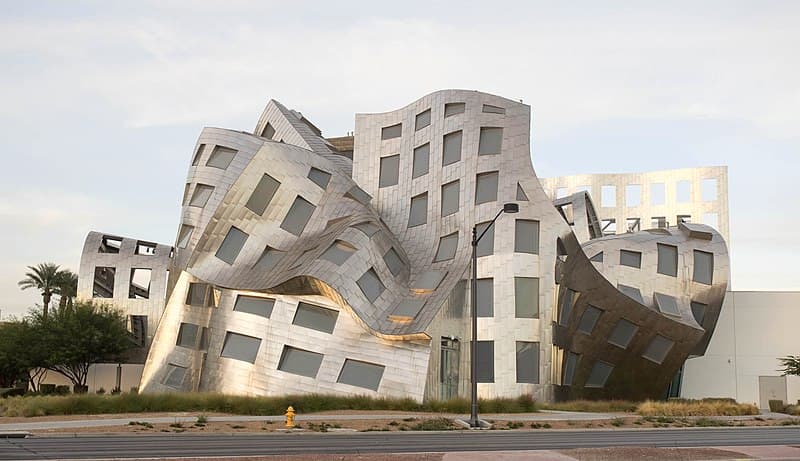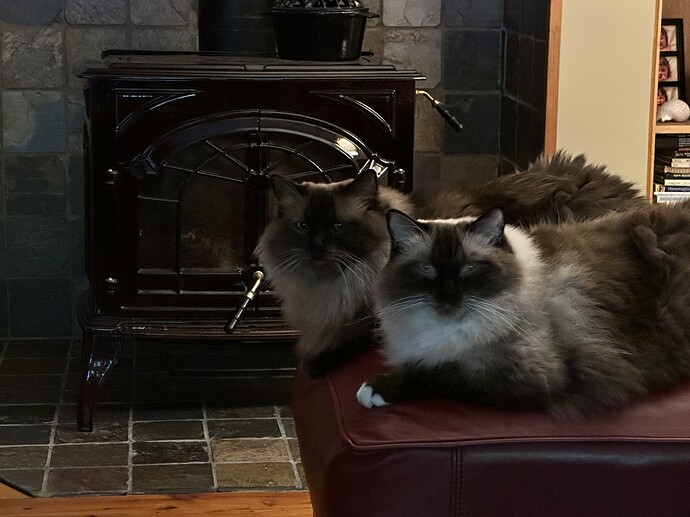It is fashionable for utopian (read “holier than thou") tech companies, particularly, to establish “sandboxes” where their minions can pretend they are human children and play or “express themselves” in (God help us) “safe spaces”. Here, I will suggest that sandboxes are substantially un-representative of the world most of us experience. There is far more of the real human experience, I submit, for the vast majority of us in litter boxes rather than sandboxes (sand for this purpose intended for children, by the way, must be sterilized for “safety”). Further, this is not altogether unfortunate. Permit me to elaborate.
In 2021, in the middle of the fear-fueled, choreographed Covidian brand of introductory tyranny (international collusion, writ large), our daughter and SIL gave us a Ragdoll male kitten as a surprise gift. He came, neutered, with identity chip implanted, from a well-respected breeder, all of whose kittens are hand raised in their household; he was 3 months old. He was so greatly adored - white fluff ball that he was - that we had trouble naming him. Given the adoration, we called him “The Adored”, contracted to “Theodore”, Theo for short. Wanting to be good parents, we got him lots of kitty toys. These were insufficient we believed, so we got him a Ragdoll playmate - “Rudey” - who arrived two months later from the same breeder. His personality was such that the accent was on the “rude”. We also call him Rudey Bagel, Rudey Baga or Your Royal Rudeness. Without ever a hiss or a cat fight, they got along purrfectly from the start, complete with mutual grooming (yes, there still is a nice kind of grooming and heartwarming to watch).
Up until the feline epoch here described, “happiness” had generally eluded me. The most accurate descriptor for my affect through much of my life was “anhedonic”. All that finally changed at age 77, thanks to these two kitties. Up until then, fulfilling my duties competently was as close to “happy” as I got. As a kid, by way of background, I was smart and studied hard - not primarily because of a great thirst for knowledge - but in a desperate quest for affirmation. I believed that if I accomplished things (particularly academic), I would be told I am the worthwhile person I suspected I was not. I can report that - an MA, MS (physiology), NJ real estate license, Commercial Pilot’s License, Instrument Rating, Flight Instructor Certificate, MD and JD for good measure with admission to the PA Bar - did not summate so as to instill that elusive, positive self-image I so earnestly sought in worldly and visible endeavors; neither did they give me any joy. Although I objectively excelled at these pursuits, my self image remained fixed to the stars of my dad’s formative admonition: “you’ll never amount to anything”.
That and similar paternal statements took me years to digest and understand; they are the subject for another story, however. Suffice it to say for now that these were more about his image of himself rather than about me. Long story short: I did well, professionally, as an anesthesiologist and on the third try, became a decent husband and father. All of which is to merely relate that I have had more pure, unadulterated joy from these two cats for the past two years than I had in the previous 77 years of my life.
Which brings me back to the cats and “litteracy”. Unlike the dogs I had as a kid, cats are not very demonstrative of love - or of most other feeling not involving claws or teeth. That boy I was with the dogs actually disliked cats. The sudden, intense love for these, then, came as quite a surprise. Since my wife was largely incapacitated with lupus and Parkinson’s when our family suddenly expanded in 2021 (she has much improved thanks to correct diagnosis, medication, 2 cataract surgeries and 2 hip replacements), I was the sole cat caretaker for the first 18 months. Which brings me to litter and its significant effects on me. No, not my asthma, because I wear an N95 mask when handling it, due to the fine dust inevitably stirred up. But first, another brief digression.
About 35 years ago, my wife, Gigi, found a mostly-Ragdoll male at the pound. He was called Rasmus by our daughter in honor of the philosopher, minus his first syllable for the sake of familiarity and euphonics. He was neutered and de-clawed (though we wouldn’t remove claws today) soon after we got him. He was a really great cat. He bonded with Gigi; I swear it was almost like imprinting. There are probably pheromones involved, though, because Theo and Rudey will only plunk down and sleep on Gigi’s lap, never on mine. I am actually jealous of this. Anyway, Gigi and Rasmus talked in echo-like “meows”, back and forth for incredibly long periods! I should credit Gigi with one of her great skills, here. Being from WV, this was but one example of some mean barnyard imitations she can do. At the time Rasmus was with us, I was too busy working at the hospital for much involvement with him, so Gigi mostly took care of him.
However, in an effort to help out, I bought a self-raking litter box. Its collection receptacle was too small, however. This brought out my inner engineer, so out of HVAC duct, pop-rivets and foam, I fashioned a chute from the outlet of the box, through what was formerly a pet door opening in the laundry room wall out to a covered shed. In the shed was a milk crate, lined with heavy plastic garbage bags, to catch the detritus. I weatherproofed and bug-proofed the passage throught the wall; the contraption actually worked very well, indeed. I was sufficiently proud of my creation that I named it: “The Catch - It! Chute” (correct pronunciation by elision of the words reveals the only slightly-hidden true meaning). All of which is told merely to indicate how I might be disposed toward philosophy and linguistics while cleaning our present “manual” litter box.
To begin with, I was incredulous to see how small were the litter boxes advertised to be for multiple cats; they were pitifully small. I couldn’t imagine how two soon-to-be 18 pound cats could comfortably or hygienically dispose themselves in them. After some considerable searching, I found a more congenial size, along with heavy duty metal scoops (plastic ones are basically disposable). Anyway, as I set to work on this daily task, my attitude underwent an unexpected and pleasant change. What was initially a distasteful chore, like many in old age, it took on a new tenor.
I was truly surprised at myself; rather than resenting such chores and considering them burdens - like when I was younger - I found myself grateful to be able to still do them! (I actually began to cultivate this parallax view of life while Gigi was incapacitated for four years and I had to do everything around the house). I do make such tasks as physically tolerable for myself as possible, though. In the case of the litter box, I have a small rug next to it, folded over several times, upon which to kneel. I also have a gooseneck LED lamp to illuminate the area (it’s on a smart plug for the kitties’ easy viewing at night) and two small stay-open plastic-lined pails adjacent, to hold the scoopings until garbage day.
As time passed, I started to become somewhat reflective during the 3 - 4 minutes involvement in this effort. First, I realized that when it comes to cats, love isn’t just a feeling I have for them. It is more a series of actions I take on their behalf. Doing things like cleaning that box, providing fresh food & water twice a day on clean plates/bowls, brushing their long hair, are the love they need to have comfortable cat lives. Inspecting them and treating them for fleas, which they somehow got despite being strictly indoor cats or taking them to the vet when they seem not quite right (illness is hard to spot with cats) are other examples of love in action. This all gives me some of that long sought-for self-affirmation.
As well, I realized that the daily litter routine is, in a sense, intimate only partly in the love/caring dimension. It is one of the ways I keep tabs on their health. In med school for example, I learned that the first element of a physical examination is inspection - looking carefully; same principle applies in the litter box. Sometimes, I wonder if these critters know how to make the task more challenging for me - like when one of them pees against the side wall of the litter box, causing the clump to stick to the plastic wall. Detaching the clump causes it to shed lots of small pieces which go right through the scoop. Anyway, you get the picture. This, at times, leads me to associated childhood memories.
I remember, for example, when I learned the term “retromingent”. My bright teenage best friend, Ellis Simberloff (who has been gone 12 years already), smirkingly (he had a distinctive, self-satisfied smirk when saying anything off-color) told me this wonderful new word as we stood beside the ping pong table in his parents’ basement: it meant, he said, “pissing backwards”, like cats do. I remember it as though it were yesterday - precisely where we were standing; I think of it frequently, kneeling almost prayerfully, over the litter box. As well, I recall how, years earlier, another friend threw a rock at a cat in the neighborhood and, by pure luck, killed it with the blow to the head. Then, I shrugged it off. Now, in memory, I literally cringe.
Sometimes, the little dears can’t wait to get in to the nice clean box to destroy my small version of an orderly, raked Japanese rock garden. Last week, I went into the laundry room where the box lives, only to find my N95 mask missing from its usual place on the overhanging LED lamp. Where was it? In the litter box. What condition was it in? Peed-on!! Here is a succinct and poignant example of just why the litter box is a better metaphor for life than the sandbox. See what I mean?
Now, while it surely took nimble paw-work typical of feline playfulness to get the head straps of the mask off the gooseneck lamp and into the litter box, in no way was this due to malevolence. Our cats, at least, lack that capacity. Their sweetness (or at worst aloofness)(Ragdolls are known for sweet temperaments) exclude even the possibility. The fact that the mask was peed-upon, retromingently, no doubt, I can only attribute to the vicissitudes of life. Thus, I submit dear reader, this constitutes clear and convincing evidence for my bold assertion that the litter box paradigm is far more realistic and heuristic than the sandbox image put forth by our betters in Silicone (sic) Valley.


